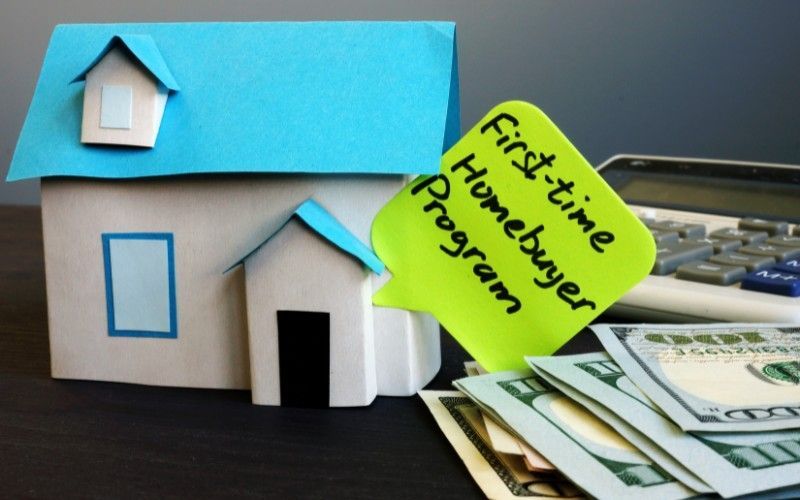Financially Ready, Steady, Buy! The Homebuyer's Financial Compass

Purchasing a first home is an exciting milestone in anyone’s life. However, saving up enough money for a down payment and covering closing costs for home purchases can often feel out of reach, especially for first-time homebuyers.
The good news is that there are numerous programs and assistance options aimed at helping first-time buyers overcome these financial hurdles. Through down payment programs, assistance loans, grants, specialized mortgages, and other incentives, new homebuyers can get the help they need to achieve their dream of homeownership.
This guide will explore the most popular types of first-time homebuyer assistance programs available from governments, nonprofits, employers, and lenders. We’ll look at the benefits these programs offer, eligibility requirements, and how to find and apply for programs in your state or area.
Before delving into the various assistance programs, it's essential to understand the 10 things you should know before buying a home to ensure a smooth homebuying journey. Let’s review the mortgage lender and many options to save money and make homeownership a reality.
Types of First-Time Homebuyer Loans and Programs
There are a variety of loans and programs designed to help first-time homebuyers overcome obstacles like saving for a down payment or covering closing costs.
Here are some of the most common types of assistance available:
Low Down Payment Conventional Loans
Conventional loans not backed by the government typically require a 20% down payment. However, Fannie Mae and Freddie Mac offer conventional financing options for first-time homebuyers with as little as 3% down.
Conventional 97
- Requires just a 3% down payment
- Minimum credit score of 620
- Private mortgage insurance (PMI) is required
- Fixed-rate loan term of 30 years
HomeReady Mortgage
- Offered by Fannie Mae
- 3% minimum down payment
- Designed for low- to moderate-income buyers
- Requires minimum 620 credit score
Home Possible Mortgage
- Freddie Mac's 3% down program
- Reduced mortgage rates/closing costs
- For low- to moderate-income buyers
- Minimum 660 credit score
These conventional loans offer more flexible qualification guidelines. This allows first-time buyers to get a home loan approved with less cash upfront and lower credit scores.
Down Payment Assistance
Coming up with enough savings for a down payment is one of the biggest barriers for prospective first-time homebuyers. That's where down payment assistance programs (DPA) can help cover this major upfront cost.
DPA Loans
- Structured as second mortgages requiring repayment
- Include low-interest loans, deferred payment loans, and forgivable loans
- Help buyers qualify for affordable first mortgages
DPA Grants
- Given by governments, charities, housing programs
- Do not need to be repaid
- Free assistance for the down payment
Down Payment Savings Matches
- Programs that match a portion of the buyer's savings
- Matched funds can only go toward down payment/closing costs
- Receives match after completing required savings period
Down Payment Tax Credits
- Proposed credits up to $15,000 to reduce tax liability
- Issued by the IRS to help buyers cover their down payment.
DPA in its various forms gives first-time buyers access to more affordable loan options by reducing the interest rate and covering the hurdle of the down payment requirement.
Closing Cost Assistance
In addition to the full down payment requirement, first-time homebuyers must budget for closing costs, which can run anywhere from 2-5% of the total purchase price. Here are some ways first-timers can get help with closing costs.
Grants
- First-time homebuyer grants that can cover closing costs
- Given by governments, non-profits, charities
Seller Concessions
- Sellers can agree to cover certain closing costs
- This may include title insurance fees, transfer taxes, etc.
Lender Credits
- Lenders may offer credits to cover appraisal or origination fees
- This may require paying a slightly higher interest rate
Getting help with closing costs improves affordability and allows buyers to save more cash for the down payment.
Homebuyer Education Programs
One of the most valuable resources for many first-time homebuyers is education. Homebuyer education helps buyers understand the entire process.
Homebuyer Education Benefits:
- Budgeting and improving credit
- Working with real estate agents
- Qualifying for a mortgage
- Shopping for a home
- Reviewing contracts and paperwork
- Preparing for closing day
Many state housing agencies and HUD-approved organizations offer homebuyer education online, in-person, or virtually. Programs help buyers become informed consumers so they can confidently navigate the major purchases.
Government-Backed Loans
Federal government agencies including FHA, VA, and USDA offer mortgage programs that first-time buyers can utilize with more flexible requirements.
FHA Loans
- Backed by Federal Housing Administration
- Minimum 3.5% down payment
- Minimum 580 credit score
- Requires mortgage insurance
VA Loans
- Offered by the Department of Veterans Affairs
- For veterans, active military, surviving spouses
- No down payment or mortgage insurance required
USDA Loans
- From Dept. of Agriculture for rural areas
- 100% financing, no down payment
- Must meet income requirements
These programs give buyers alternative options that allow lower down payments, lower credit scores, and other benefits.
Government-backed loans open up homeownership to a wider pool of buyers who may not qualify for conventional financing. The programs remove some of the biggest hurdles like minimum down payments and credit score minimums.
First-time buyers should research the unique requirements and benefits of each program to determine if they are a good fit. Connecting with a lender is the best way to learn about eligibility and get the mortgage process started.
Benefits and Qualifications for First-Time Homebuyer Programs
First-time homebuyer programs offer tempting benefits like down payment grants, lower interest rates, and relaxed lending standards. However, buyers need to meet certain criteria to qualify for most programs.
Benefits of First-Time Homebuyer Programs
Down Payment Help
Grants, loans, and assistance with down payments make home prices and buying more affordable.
Closing Cost Assistance
Programs help cover closing fees from 2% to 5% of the purchase price.
Lower Interest Rates
Some programs offer below-market interest rates and rates reserved for first-time buyers.
Relaxed Lending Standards
Programs allow lower credit scores and debt-to-income ratios.
Homebuyer Education
Free classes explain the home-buying process from start to finish.
Building Generational Wealth
Achieving homeownership helps save money and create financial stability.
Assistance programs enable first-time buyers to get into a home sooner while paying less in upfront costs and building equity.
Qualifications for First-Time Homebuyer Programs
Income Limits
Based on a percentage of the county or metro area median income.
Purchase Price Limits
Maximum home value varies by location.
Credit Score Minimums
Each program sets a fixed interest rate and minimum credit score.
Occupancy Requirements
Most programs require the property to be used as a primary residence, with some allowing it to be used as a second mortgage.
Location Requirements
Some government loans limit eligible homes.
First-Time Buyer Status
Programs define "first-time buyers" differently.
Buyers must review the fine print to confirm they meet all eligibility criteria before completing an application or starting the home search.
Important First-Time Home Buyer Requirements
Your Income
Confirm total annual income if household income falls below the income cap.
Debt-to-Income Ratio
Must meet program DTI limits (often 45%). Before considering a home purchase, it's often advisable to pay off significant debts to improve your financial position.
Credit Score
Minimum scores range from 500 to 640 for many programs. If your credit score is on the lower side, learn more about how to buy a house with bad credit to better prepare yourself.
Employment History
Most require at least 12 months with current employer.
First-Time Buyer Status
May or may not allow previous home ownership.
Property Condition
Some government loans restrict eligible homes.
Primary Residence
Using a home as a second mortgage or primary principal residence is generally required.
While program benefits are enticing, buyers have the responsibility to ensure they actually qualify before completing an application or making an offer. Confirming eligibility for a program early in the process is key.
Finding and Applying for First-Time Homebuyer Programs
First-time homebuyers have to conduct research and work with lenders to locate programs available to them.
Researching First-Time Homebuyer Programs
Conduct research to find programs you may qualify for:
- Check your state housing finance agency’s website - Most states offer first-time buyer programs.
- Visit your local government websites - Cities and counties may have assistance options.
- Search for nonprofit organizations in your area - Nonprofits sometimes administer programs.
- Ask real estate agents for local first-time buyer options - Agents are often familiar with area programs.
- Look for articles on first-time buyer assistance in your state - News sites sometimes list programs.
Cast a wide net and look at multiple sources to uncover all potential options in your area.
Working with Lenders
Connecting with lenders is key since they provide eligible mortgages:
- Ask banks/lenders about first-time buyer products - Many have specialty options.
- Get Preapproved - Preapproval confirms you qualify and can access programs.
- Review down payment assistance the lender offers - Ask about grants, loans, and savings matches.
- Discuss closing cost help available - Grants, seller concessions, lender credits.
- Compare multiple lenders - Rates/fees for first-time programs can vary.
Develop relationships with mortgage lenders and learn about loan programs and how they can facilitate your home loan program in use.
Eligibility Verification
Finally, you'll need to verify eligibility:
- Review requirements - Confirm your situation aligns with program guidelines.
- Submit documentation - Be ready to provide financial statements, tax returns, etc.
- Complete applications - Formally apply for any program you seek to utilize.
- Get approval - Obtain written commitment of assistance before closing.
The bottom line is financial assistance is not guaranteed just because you are a first-time buyer. You have to conduct research, verify eligibility, and complete the required steps to secure benefits like down payment help.
With a methodical approach, first-time home-time buyers can discover and prepare for the ideal homeownership program to match their needs.
FAQs
Conclusion
Buying a first home is an exciting milestone, but saving for a down payment along with closing costs can be prohibitive for many prospective buyers. Fortunately, those new to homeownership can turn to specialized mortgage payment assistance programs for help.
Homebuyers have many options when it comes to down payment assistance loans and grants, closing cost help, discounted mortgage rates, and relaxed lending standards. Many state and local governments, employers, nonprofits, and lenders administer programs catered to the unique needs of first-time buyers.
While benefits like down payment grants or lower mortgage rates are enticing, buyers must take time to research programs, confirm eligibility, and verify they meet all requirements before completing an application. Income limits, first-home purchase price caps, credit score minimums, and occupancy standards apply to most programs.
Working with an experienced mortgage lender, and real estate agent can help first-time buyers identify tailored financing options in their area to help them achieve their dream of owning a home. Taking advantage of assistance programs can start buyers on the path to building long-term wealth through home-ownership sooner.
If you are struggling with overwhelming student loan debt and want to explore relief options, Pacific Debt Relief offers a free consultation to assess your financial situation.
Reduce Your Credit Card Debt By Up to Half

BBB Reviews | 4.9/5.0 Rating









 Do Not Sell My Personal Information
Do Not Sell My Personal Information